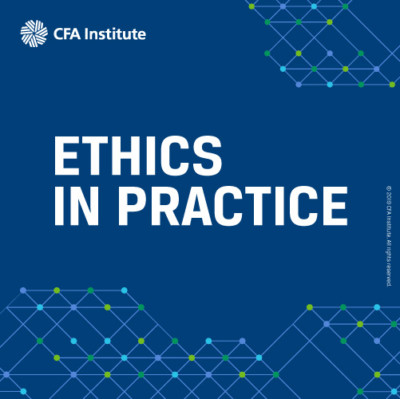Ethics in Practice: Soft Dollar Expenditures. Case and Analysis–Week of 10 June
How did you do evaluating this week’s (10 June) case? Check out the analysis below.
Case
Murdoch is founder, president, and head portfolio manager of IOM Capital Management (IOM), an investment adviser providing investment advice to four affiliated hedge funds as well as separate client accounts. IOM accumulates and uses soft dollar credits primarily at a single broker/dealer through equity and options trading for the IOM funds and individual client accounts. IOM discloses allowable uses of soft dollars through its regulatory filings and offering memoranda for IOM funds. The disclosures provide that soft dollars may be used for “overhead expenses,” including “office services, equipment, and supplies.” IOM rents a portion of Murdoch’s personal residence to conduct its business. IOM pays $6,000 in rent to a company Murdoch owns, which, in turn, pays $5,855 to a local bank to cover the monthly mortgage payment for the property. Eventually, IOM and Murdoch request that the broker use soft dollars to make the rental payment. Once the broker starts paying rent using soft dollars, Murdoch raises the rent first to $10,000 per month and then to $15,000 per month. Murdoch’s actions are
- appropriate because rental payment on office space is an acceptable use of soft dollars.
- appropriate because IOM disclosed that it would use soft dollars for overhead expenses.
- appropriate because Murdoch may charge (and increase) rental rates for use of his property to the extent that the market will bear.
- inappropriate.
- none of the above.
Analysis
This case relates to Standard III(A) Loyalty, Prudence, and Care and the use of soft dollar credits. Soft dollar credits arise from the client commission arrangement between an investment adviser and the broker/dealer that handles the trades for the adviser. Generally, a client’s investment assets are used to pay additional commissions — called “soft dollar credits” — that the broker/dealer sets aside as payment for legitimate research and expenses of the adviser. CFA Institute members who pay higher brokerage commissions to receive soft dollar credits to purchase goods or services, without ensuring a corresponding benefit to the client, violate their duty of loyalty to the client under CFA Institute Standard III(A). In many regulatory regimes and under CFA Institute soft dollar standards, using soft dollars to make office rental payments would not be an acceptable use of soft dollars. Even assuming that such a practice was allowed, in this case, Murdoch and IOM disclose only that soft dollars will be used for “overhead expenses,” but they do not provide that soft dollars would be used to pay rent. Therefore, the disclosure is incomplete and ineffective. Finally, it appears that the 150% increase in rent once soft dollars are used to make payments is simply an attempt to enrich Murdoch at the expense of his clients. A reasonable client or investor would not know that IOM uses its commissions to pay rent on a property that Murdoch also uses for personal purposes, that IOM pays inflated rent on that personal property, and that Murdoch could divert soft dollars for his personal use. Choice D is the best response.
This case is based on a May 2019 US SEC Enforcement Action.
Let us know what you think of Ethics in Practice by taking this short survey.
Have an idea for a case for us to feature? Send it to us at [email protected].
More About the Ethics in Practice Series
Just as you need to practice to become proficient at playing a musical instrument, public speaking, or playing a sport, practicing assessing and analyzing situations and making ethical decisions develops your ethical decision-making skills. The Ethics in Practice series gives you an opportunity to “exercise” your ethical decision-making skills. Each week, we post a short vignette, drawn from real-world circumstances, regulatory cases, and CFA Institute Professional Conduct investigations, along with possible responses/actions. We then encourage you to assess the case using the CFA Institute Ethical Decision-Making Framework and through the lens of the CFA Institute Code of Ethics and Standards of Professional Conduct. Then join the conversation and let us know which of the choices you believe is the right one and explain why. Later in the week, we will post an analysis of the case and you can see how your response compares.
Image Credit: ©CFA Institute


Inappropriate, soft dollars should be used for clients benefit and not for business expenses. Merely disclosing it doesn’t serves the purpose.